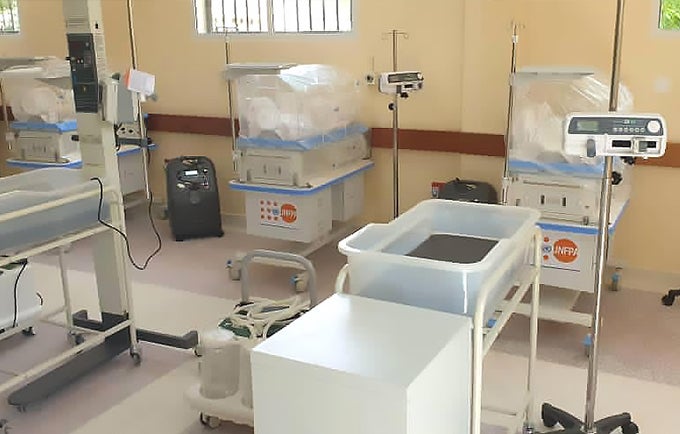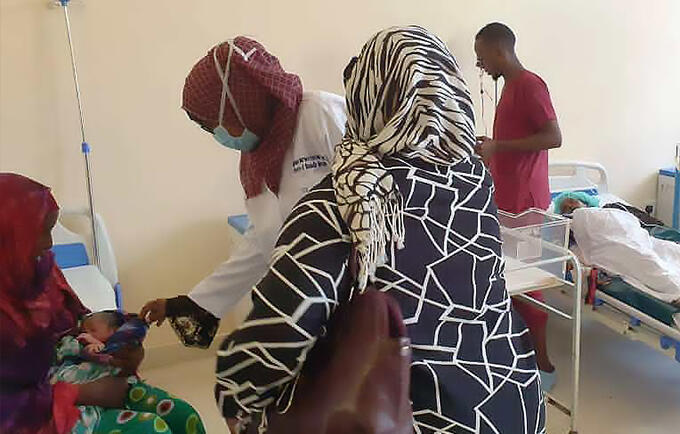The Federal Ministry of Health and Human Services in Somalia, under the leadership of the Minister Her Excellency Dr. Fawziya Abikar, with the support of UNFPA and other partners has spared no effort in maintaining the essential services as the COVID-19 pandemic country continues to rage on. UNFPA continues to support maternal and newborn services across Somalia and in particular at the main referral hospitals in Mogadishu.
Keeping in mind reductions in access to and utilization of essential maternal and newborn health (MNH) services during epidemics translates into important increases in the number of women and newborns who suffer complications or die during pregnancy, childbirth and the postnatal periodIn these unprecedented times, health systems are being challenged by increasing demand for care of people with COVID-19, compounded by fear, stigma, misinformation and limitations on the movement that disrupt the delivery of health care for all conditions. In November cumulatively there are 4,445 confirmed cases in Somalia with 113 confirmed death cases. This figure which might only be the tip of the iceberg as a lot of the people in Somalia do not come forward for testing. In any pandemic, health systems are overwhelmed, and people fail to access needed care, both direct mortality from an outbreak and indirect mortality from preventable and treatable conditions increase dramatically.
Basic and comprehensive emergency obstetric care services in Somalia remain a challenge considering the continued high burden of maternal and newborn mortality in this triple threat that the country is facing and resulting in shock and pushing the Somali population in a humanitarian situation that they cannot cope with. Apart from COVID-19, Somalia is grappling with a locust invasion and floods.
Comprehensive Emergency Obstetric and Newborn Care
Banadir Hospital, a mother and child hospital, is the main referral hospital that delivers free Emergency Obstetric and Newborn Care (EmONC) where 3,990 Normal Vaginal Deliveries(SVD) were attended by skilled birth attendants (SBA) since January 2020, and 624 (15%) mothers who were in labour were unable to deliver normally and have undergone Caesarian section to deliver the mother and her baby safely.
During pregnancy, life-threatening obstetric emergencies are common, and without immediate health intervention, many mothers will lose their lives or the lives of their babies. During this period of the COVID-19 pandemic 3,489 mothers with pregnancy-related complications received care to avert preventable maternal mortality. Thirty-four percent of these complications were severe anaemia during pregnancy. Some of the mothers received a blood transfusion for the correction of anaemia during pregnancy. Three hundred and fifty-five (10%) of the mothers received post-abortion care, and 419 (12%) of mothers were admitted for life-threatening hypertensive conditions (eclampsia). One hundred and sixty-two pregnancy-related bleeding disorders (antepartum & postpartum) received quality care at the Banadir Hospital.
On the other hand, 1,462 clients received the different modern contraceptive methods at the Banadir Hospital. Even a modest decline in service coverage during pregnancy and for newborns could result in a significant number of maternal deaths, newborn deaths, and unintended pregnancies as family planning services face disruptions too.
UNFPA Somalia Representative Mr. Anders Thomsen visited Banadir Hospital on 25 November 2020. During the visit, it was evident that qualified midwives and other health care workers play a vital role to relieve the suffering and save lives of the mother and newborn even during the COVID-19 pandemic. Strict Infection Prevention and Control measures are a new burden to the health care workers that they need to cope with to prevent the hospital from being a source of COVID-19 infections. Health workers were on partial PPE such as masks and gloves during their routines, and they had also adopted Non-Pharmaceutical Interventions (NPI) such as social distancing and regular handwashing.
“UNFPA is impressed in the quality of services that Banadir Hospital is delivering 24/7 to the Somali mothers and newborns and the tireless efforts of the health care workers in saving lives in these trying times of the COVID-19 Pandemic. We thank our generous donors; Sweden, Finland, Switzerland, Canada and Italy allocated an additional earmarked amount. Their support has made a positive impact on Somali women and children,” said Mr. Thomsen.
The Director of Banadir Hospital, Ms. Fartun Sharif, informed UNFPA that she is proud of the hard work by the health care workers. “They work day and night to deliver pregnant women safely and offer other lifesaving services under strict infection prevention control of the COVID-19 disease to save lives while staying safe and avoiding transmission of the disease,” she said
Establishment of Neonatal Intensive Cate Units (NICU)
Not all babies born alive in the hospital are born in full-term; some are born before the mother has reached 37 weeks of gestation, they are known as premature babies. Others are born with a low birth weight of less than 2.5 kg and others are born with a very low birth weight of 1.5 kg. To help these babies survive, they will be placed in an incubator which provides the newborn the environmental conditions needed to thrive. UNFPA, with the generous support of the the Italian Development Cooperation procured newborn essential equipment including 10 incubators and 6 infant radiant warmers. The UNFPA Representative handed over the supplies to functionalize the Neonatal Intensive Care Unit (NICU) in Banadir Hospital. This will be the only NICU in a public hospital with well-established and functioning equipment that deliver services for free in Mogadishu.

equipment donated to Banadir Hospital
Beyond its direct effect on mortality, the COVID-19 pandemic is disrupting the provision of health care services globally, resulting in an increase in the number of deaths from non-COVID-19 causes. Somalia had faced the same in the early days of the pandemic. But UNFPA, MOH and partners with the generous support of donors, has undertaken all efforts in avoiding hard-earned health gains to be reversed. UNFPA is committed to maintaining the access to high-quality essential maternal and newborn health services, thriving for positive health impact to Somali women and children and contributes in the reduction of maternal mortality in Somalia.
--- Dr. Ahmed Aweis Ahmed


